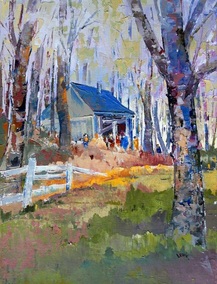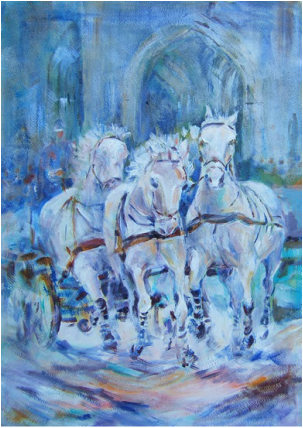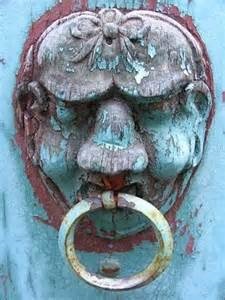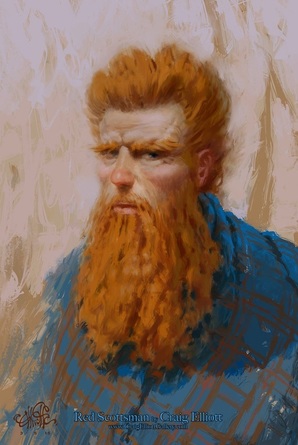Night-time, February 22, 1878
| Two brothers, David John (1846–about 1900) and Thomas Albert (1839–1910) Hersey, stood in silence gazing south from the cabin's porch listening to the decaying pace of rainfall. It was only a trickle, as compared to the torrent released in the earlier hours of the day and of the previous night. The temperature was dropping and a few flakes of snow could be seen drifting in the wind. Both brothers had warmed up and dried off inside the cabin, recovering from after their precarious, if somewhat comical, effort to ford |
the distance between Thomas's house thirty yards downhill to the cabin where their parents lived, and where they stood at that moment. From the safety of the porch they watched the abating flood.
David, using an old pipe of his father’s, lit up, trying to calm himself. The sweet aroma of tobacco blended well with the smell of fresh rain water. Thomas, reflective, was considering the cut in his right thumb and strategizing what their next actions should be. He eyed his brother, taking in David’s muddy and torn clothing; the cuts still bleeding from his eyebrows and scalp. Perhaps a ten minute trek to Doctor Fee's residence was their next best move; he would be home at this hour.
"David," Thomas said gently, not wanting to rankle his brother, "Why don't you change out of your clothes and put on something clean of father's? You would be warmer."
David's exasperated retort was short.
"I would rather go naked."
Thomas sighed and gave an understanding shrug. The Old Man had been unnecessarily hard on David.
"Well. Let's make our way to Sam Fee's (about 1840-1905) house. It will be a short walk. The flood has ebbed." Thomas added an attempt at humor, "He can tend our battle wounds."
Not in the mood for levity, David snorted and threw Thomas a scornful sideways glance. He also sighed, reluctantly accepting the suggestion.
"Aye, all right. To Fee's it is."
The pair set out, leaving Thomas's two youngest sons with their parents in the cabin. Most likely young Ernest would prevent father from getting back onto the roof and creating another spectacle for the neighborhood.
Their pace was calm, a change from the frenetic activities of the past few hours. After about two hundred yards in a southerly direction they turned left onto the mud that was Princess Street. The only sounds were the sucking noises of their footsteps in the mud, a small wind in the trees, and the faint drops of water falling onto the sludge.
In the next minutes, off in the distance up Princess Street, came a series of growing sounds; cracks, thuds, short shouts. The two brothers stopped in their tracks and peered off into the dimming light. They next glanced at each other, four eyebrows raised in curiosity. The sounds became alarmingly louder. A blur of heaving white horses began to materialize in the distance, and the ominous sounds became dangerously present.
Thomas flew into action. "David!" he yelled; grabbing his brother, throwing him into the gutter of the road and falling on top of him protectively. Rushing past them was a horse drawn carriage flying at top speed. The cabby, who most likely had not seen the two in the dark, was wildly cracking his whip and shouting full voice at the racing horses. The carriage recklessly careened north off of Princess Street onto Chatham, spewing gushes of muck and spritzes of water every-which-way, mainly onto the two brothers. The pair remained on the ground for several minutes, catching their breath and waiting for their pumping hearts to calm. It was a very close call.
David, using an old pipe of his father’s, lit up, trying to calm himself. The sweet aroma of tobacco blended well with the smell of fresh rain water. Thomas, reflective, was considering the cut in his right thumb and strategizing what their next actions should be. He eyed his brother, taking in David’s muddy and torn clothing; the cuts still bleeding from his eyebrows and scalp. Perhaps a ten minute trek to Doctor Fee's residence was their next best move; he would be home at this hour.
"David," Thomas said gently, not wanting to rankle his brother, "Why don't you change out of your clothes and put on something clean of father's? You would be warmer."
David's exasperated retort was short.
"I would rather go naked."
Thomas sighed and gave an understanding shrug. The Old Man had been unnecessarily hard on David.
"Well. Let's make our way to Sam Fee's (about 1840-1905) house. It will be a short walk. The flood has ebbed." Thomas added an attempt at humor, "He can tend our battle wounds."
Not in the mood for levity, David snorted and threw Thomas a scornful sideways glance. He also sighed, reluctantly accepting the suggestion.
"Aye, all right. To Fee's it is."
The pair set out, leaving Thomas's two youngest sons with their parents in the cabin. Most likely young Ernest would prevent father from getting back onto the roof and creating another spectacle for the neighborhood.
Their pace was calm, a change from the frenetic activities of the past few hours. After about two hundred yards in a southerly direction they turned left onto the mud that was Princess Street. The only sounds were the sucking noises of their footsteps in the mud, a small wind in the trees, and the faint drops of water falling onto the sludge.
In the next minutes, off in the distance up Princess Street, came a series of growing sounds; cracks, thuds, short shouts. The two brothers stopped in their tracks and peered off into the dimming light. They next glanced at each other, four eyebrows raised in curiosity. The sounds became alarmingly louder. A blur of heaving white horses began to materialize in the distance, and the ominous sounds became dangerously present.
Thomas flew into action. "David!" he yelled; grabbing his brother, throwing him into the gutter of the road and falling on top of him protectively. Rushing past them was a horse drawn carriage flying at top speed. The cabby, who most likely had not seen the two in the dark, was wildly cracking his whip and shouting full voice at the racing horses. The carriage recklessly careened north off of Princess Street onto Chatham, spewing gushes of muck and spritzes of water every-which-way, mainly onto the two brothers. The pair remained on the ground for several minutes, catching their breath and waiting for their pumping hearts to calm. It was a very close call.
It was at this point, after the hellish stormy afternoon, the evening of mud, wind, cold, crushing falls, and ruined attire, that David began to fall apart. He began to shake. The shaking grew and with his voice near panic, he started yelling.
"Thomas, I cannot take any more!!!"
"Now, David, it is all right. The crazy fool is gone now. Let's keep going." In his head Thomas affixed extremely un-Methodist adjectives to the driver, the horses, and to whoever was riding inside the carriage.
Wet and muddy, they made the rest of the way to Dr. Fee's residence on Division Street. Through the windows they could see lit lamps, a good sign. They limped up the portico and Thomas knocked on the door. After thirty seconds David began pounding his fists on the wood. On the other side of the door they could hear a scurry of footsteps. Thomas grabbed his brother’s arms to stop the banging. The lock rattled. The door opened just a peek to reveal a diminutive, red haired Irish girl wearing a maid's uniform.
"We need Dr. Fee's help,” announced Thomas. "I have a severely cut thumb and my brother here has gashes around his head."
The girl eyed the condition of the David's clothes and closed the gap in the door just a smidgen more.
"Doc Fee'd be not 'ere"
"What, girl?? Come now, we need help!"
"Yon 'bout two hour ago the 'ospital sent a carriage to fetch 'im. There'd be an ‘ uge mass o' folk a’ needin' help this eve wit' the flood an' all."
She eyed the two of them suspiciously. "Ye best be on your way to 'ospital, now." And she slammed the door in their faces.
The brothers shared a few tense moments of silent irritability, staring at the goblin door knocker positioned inches from their noses.
"Thomas, I cannot take any more!!!"
"Now, David, it is all right. The crazy fool is gone now. Let's keep going." In his head Thomas affixed extremely un-Methodist adjectives to the driver, the horses, and to whoever was riding inside the carriage.
Wet and muddy, they made the rest of the way to Dr. Fee's residence on Division Street. Through the windows they could see lit lamps, a good sign. They limped up the portico and Thomas knocked on the door. After thirty seconds David began pounding his fists on the wood. On the other side of the door they could hear a scurry of footsteps. Thomas grabbed his brother’s arms to stop the banging. The lock rattled. The door opened just a peek to reveal a diminutive, red haired Irish girl wearing a maid's uniform.
"We need Dr. Fee's help,” announced Thomas. "I have a severely cut thumb and my brother here has gashes around his head."
The girl eyed the condition of the David's clothes and closed the gap in the door just a smidgen more.
"Doc Fee'd be not 'ere"
"What, girl?? Come now, we need help!"
"Yon 'bout two hour ago the 'ospital sent a carriage to fetch 'im. There'd be an ‘ uge mass o' folk a’ needin' help this eve wit' the flood an' all."
She eyed the two of them suspiciously. "Ye best be on your way to 'ospital, now." And she slammed the door in their faces.
The brothers shared a few tense moments of silent irritability, staring at the goblin door knocker positioned inches from their noses.
They had no other available choices; they continued south on Division Street towards the hospital.
Then it happened again; cracks, thuds, short shouts, swiftly becoming louder. This time they were forewarned. They stumbled as quickly as they could to the side of the road. The same crazy carriage shot west off of Chatham Street galloping towards them up Princess.
"Whoa, Whoa,” the cabby shrieked at the horses as they reared almost out of control. The insane driver pulled the horses to a stop on the corner directly in the brothers’ path. The carriage door flew open and out leaned their brother-in-law and David John's employer, wealthy lumber merchant William McRossie (1839–1896). Wild, fierce, frowning and Scottish, William hailed them, waving them to the carriage.
Then it happened again; cracks, thuds, short shouts, swiftly becoming louder. This time they were forewarned. They stumbled as quickly as they could to the side of the road. The same crazy carriage shot west off of Chatham Street galloping towards them up Princess.
"Whoa, Whoa,” the cabby shrieked at the horses as they reared almost out of control. The insane driver pulled the horses to a stop on the corner directly in the brothers’ path. The carriage door flew open and out leaned their brother-in-law and David John's employer, wealthy lumber merchant William McRossie (1839–1896). Wild, fierce, frowning and Scottish, William hailed them, waving them to the carriage.
"Get, in, Get, in ya' disheveled vagrants. David, donna' ye' 'ave a brain? Ya' left de front door of t’office unlocked when ya' left!!"
Oh, mental agony. David had known he had forgotten something. This put him even closer to the breaking point. Thomas knew it.
"Leave David alone, William. He's been through a hard day. And did you know that you near killed us racing up Princess Street? You almost ran us down. Are you mad?"
William was brooding and silent as the brothers climbed into the carriage. Then he motioned the cabby forward, yelling 'to ta’ 'ospital, man,’ and he snapped shut the carriage door.
"Sorry," William muttered. More silence enveloped as the carriage rocked and bumped full speed towards medical help. But William just couldn't keep quiet. Dramatically rolling his “r's” he proclaimed,
"I been oot checkin' on everyone. I just was at your house, David, not twenty minutes past. My Eltea (Elthea Annie Hersey McRossie, 1843–1904) is with your 'Lisabet (Elizabeth Kells Hersey, 1845–1931) now, David, an' your children."
Oh, praise God, William. Thank you," said David, gratefully.
William struggled to keep his thoughts to himself.
"Lisabet's a wreck, David. How could’a leave her alone with da children? And ye boys outside in da rain muckin’ in as much mud as t’ey could. Really, David! Canna' ya’ control t’ose two renegades?"
At this, David finally blew his proverbial top. He yelled at the top of his voice:
"So what, William. Why shouldn't they play in the rain? What is so sinful about that? Why shouldn’t the two get as much enjoyment out of life as they can? There surely is enough pain and grief for them later in life."
David's voice rose higher to shriek level. "And you know perfectly well that my daughters are very capable and able to take care of Elizabeth when her panic takes over. I knew exactly what I was doing leaving Elizabeth in their care."
The shriek acquired a jeering quality. "And would you rather we left father in the rain, on the roof, screaming to God for all the neighbors to enjoy?"
For at least the third time that day Thomas rolled his eyes. "Settle down. Settle down. We are all brothers here. We are each trying to do our best."
With these words an egalitarian silence surrounded the three for a few minutes. But William could not restrain himself.
"All right, all right, keep ye hats on," he muttered. Unable to stop, William pursued the attack. "T’at certainly brings to mind, David, what in ta name of God did you do to ya suit? Where in tarnation is ya right boot? You look like a corpse just climbed from a grave. So much money spent on fancies just to ruin t’em!"
With this, all civility exited stage (or carriage) door left. The three rode on, yelling at each other all the way to the hospital.
In time, the trio arrived at Kingston’s City Hospital to receive the needed medical help. The flooding was over. The night cleared. Most was forgiven. William McRossie, thinking what a fool family he had married into and satisfied that everyone was properly looked after, rode his two brothers-in-law home, bringing David John’s Flood Run to an end at last.
End of David John’s Flood Run.
Oh, mental agony. David had known he had forgotten something. This put him even closer to the breaking point. Thomas knew it.
"Leave David alone, William. He's been through a hard day. And did you know that you near killed us racing up Princess Street? You almost ran us down. Are you mad?"
William was brooding and silent as the brothers climbed into the carriage. Then he motioned the cabby forward, yelling 'to ta’ 'ospital, man,’ and he snapped shut the carriage door.
"Sorry," William muttered. More silence enveloped as the carriage rocked and bumped full speed towards medical help. But William just couldn't keep quiet. Dramatically rolling his “r's” he proclaimed,
"I been oot checkin' on everyone. I just was at your house, David, not twenty minutes past. My Eltea (Elthea Annie Hersey McRossie, 1843–1904) is with your 'Lisabet (Elizabeth Kells Hersey, 1845–1931) now, David, an' your children."
Oh, praise God, William. Thank you," said David, gratefully.
William struggled to keep his thoughts to himself.
"Lisabet's a wreck, David. How could’a leave her alone with da children? And ye boys outside in da rain muckin’ in as much mud as t’ey could. Really, David! Canna' ya’ control t’ose two renegades?"
At this, David finally blew his proverbial top. He yelled at the top of his voice:
"So what, William. Why shouldn't they play in the rain? What is so sinful about that? Why shouldn’t the two get as much enjoyment out of life as they can? There surely is enough pain and grief for them later in life."
David's voice rose higher to shriek level. "And you know perfectly well that my daughters are very capable and able to take care of Elizabeth when her panic takes over. I knew exactly what I was doing leaving Elizabeth in their care."
The shriek acquired a jeering quality. "And would you rather we left father in the rain, on the roof, screaming to God for all the neighbors to enjoy?"
For at least the third time that day Thomas rolled his eyes. "Settle down. Settle down. We are all brothers here. We are each trying to do our best."
With these words an egalitarian silence surrounded the three for a few minutes. But William could not restrain himself.
"All right, all right, keep ye hats on," he muttered. Unable to stop, William pursued the attack. "T’at certainly brings to mind, David, what in ta name of God did you do to ya suit? Where in tarnation is ya right boot? You look like a corpse just climbed from a grave. So much money spent on fancies just to ruin t’em!"
With this, all civility exited stage (or carriage) door left. The three rode on, yelling at each other all the way to the hospital.
In time, the trio arrived at Kingston’s City Hospital to receive the needed medical help. The flooding was over. The night cleared. Most was forgiven. William McRossie, thinking what a fool family he had married into and satisfied that everyone was properly looked after, rode his two brothers-in-law home, bringing David John’s Flood Run to an end at last.
End of David John’s Flood Run.
Notes:
- When David expelled the words "They should get as much enjoyment out of life now; there surely is enough pain and grief for them later in life," he knew well the truth of the statement. But he knew not the bitter prophesy of coming events these words would prove to be.
- I must repeat myself: You should be able to tell that I am very fond and partial to my great, great, great uncle David John. This story is, of course, fiction. But the people, their dates, and occupations are accurate. There was a flood on Thomas Hersey's property in February 1878 as you can read in “Ducks in a Millpond.” The particulars of each personality are out of my imagination. However Thomas Albert and David John Hersey both had distinctive scars, as you can read by scrolling to the end of “David John’s Flood Run Part IV.” The scars on David John's head seem unusual for a book-keeper. I am guessing that Thomas Albert was left handed because of his rather upright signature and his scar on his right thumb.





 RSS Feed
RSS Feed